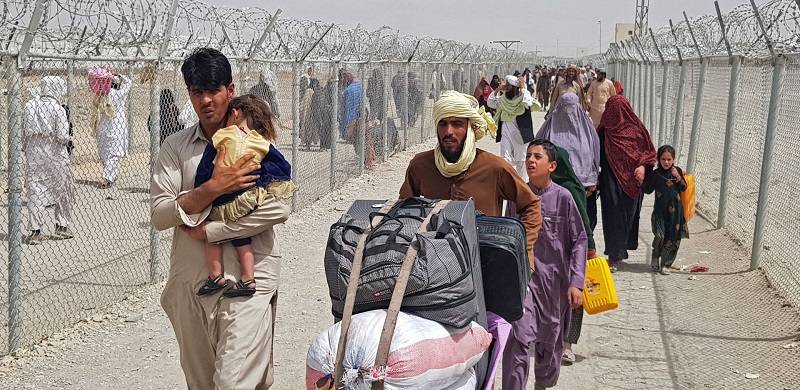
by Shaimin Raja 10 October 2023
In a significant policy decision, Pakistan has embarked on the path of repatriating more than 1.1 million illegal Afghan refugees currently residing within its borders. This decision, arising amidst ongoing tensions between Pakistan and Afghanistan, carries substantial humanitarian and geopolitical implications. In this article, we will delve into the rationale behind Pakistan’s move, the potential repercussions, and the broader regional context in which this development unfolds.
The decision to repatriate these illegal Afghan nationals is primarily driven by the security and economic concerns that have been prevalent in Pakistan. For decades, Pakistan has played host to a substantial Afghan refugee population. At its peak, an estimated five million Afghan refugees sought shelter within Pakistan’s borders. Today, while the official count of refugees possessing valid refugee cards is considerably lower, there remains a significant number of Afghan refugees who have neither visas nor valid documents allowing them to stay in the country. One crucial factor contributing to this decision is the involvement of some of these illegal Afghan residents in activities such as narcotics smuggling and the trade of banned goods under the guise of transit trade. Such activities have posed considerable challenges to Pakistan’s security apparatus and its efforts to combat illicit trade.
Another significant aspect is the erosion of goodwill and generosity that has characterized Pakistan’s approach to hosting refugees over the past four decades. Unabated and often unfounded reports of alleged mistreatment and harassment of Afghan refugees in Pakistan have, in recent times, strained the relationship between the two countries. The decision to repatriate these illegal refugees signifies a departure from Pakistan’s previous open-door policy and reflects a growing impatience with the situation.
It is crucial to view this repatriation decision in light of the broader regional context, including the ongoing challenges posed by the Tehreek-e-Taliban Pakistan (TTP). The crackdown against illegal Afghan refugees coincides with simmering tensions between Pakistan and Afghanistan, specifically concerning the TTP. Some observers have suggested a connection between Pakistan’s intensified campaign against these refugees and the Afghan Taliban’s apparent reluctance to take robust action against the TTP. Pakistan has long demanded that the Afghan Taliban address the TTP threat, which operates from Afghan soil and continues to pose a significant security risk to Pakistan. Despite repeated assurances from the Afghan Taliban, Pakistan remains skeptical due to past unfulfilled commitments.
This skepticism has fueled Pakistan’s frustration, prompting it to take a harder stance against illegal Afghan refugees. It is worth noting that Pakistan’s efforts to press the Afghan Taliban to act against the TTP have intensified recently, with a Pakistani delegation, led by Special Envoy on Afghanistan Ambassador Asif Durrani, visiting Kabul to convey these concerns. While the Afghan Taliban have made promises to address the TTP issue, their previous commitments have not always yielded tangible results.
The decision to repatriate over a million Afghan refugees without valid documentation raises significant humanitarian concerns. The UN High Commissioner for Refugees (UNHCR) has consistently opposed forced repatriation, emphasizing the importance of voluntary and dignified return for refugees. The UNHCR’s stance underscores the necessity of considering the welfare and human rights of these refugees, many of whom may face insecurity and instability upon returning to Afghanistan. Furthermore, this move by Pakistan may trigger a reaction from the Afghan Taliban government. The relationship between Pakistan and the Afghan Taliban is complex, with both sides having their own expectations and priorities. Pakistan’s decision to expel Afghan refugees could potentially strain its relations with the Afghan Taliban, particularly if the refugees face difficulties upon their return to Afghanistan.
Beyond the immediate humanitarian concerns, Pakistan’s decision has geopolitical implications. The regional dynamics are evolving rapidly, with Afghanistan undergoing a significant transformation under Taliban rule. Pakistan’s actions may impact its standing in the region and its relations with key stakeholders, including Western powers. The West, particularly the United States and its allies, has been closely monitoring the situation in Afghanistan and seeking to ensure that the Afghan Taliban uphold their commitments, including respecting human rights and preventing Afghanistan from becoming a safe haven for terrorists. Pakistan’s decision to repatriate Afghan refugees may be seen as a signal of its shifting priorities and a more assertive stance in managing its own security concerns.
Pakistan’s decision to repatriate more than 1.1 million illegal Afghan refugees is a significant policy move with far-reaching implications. It underscores Pakistan’s growing impatience with the challenges posed by this refugee population, particularly in the context of security threats such as the TTP. However, the decision also raises humanitarian concerns and could strain Pakistan’s relations with the Afghan Taliban, as well as its standing in the international community. As this situation unfolds, it is essential for all stakeholders to prioritize the welfare and rights of Afghan refugees and seek solutions that uphold humanitarian principles while addressing legitimate security concerns. The region faces a complex and evolving landscape, and the decisions made today will undoubtedly shape its future. Pakistan’s move should serve as a catalyst for a broader dialogue on refugee management, regional security, and the pursuit of stability in Afghanistan and the surrounding region.
